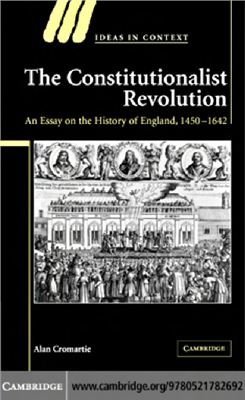Cambridge: Cambridge University Press, 2006. 328 pages.
ISBN 0521782694
An innovative account of English constitutional ideas from the mid-fifteenth century to the time of Charles I, showing how the emergence of grand claims for common law, the country's strange unwritten legal system, shaped England's cultural development. This is the first such study for a generation. Though he does not neglect the role of narrowly religious disagreements, Cromartie brings out the way that 'religious' and 'secular' values came to be closely intertwined: to the majority of Charles's subjects, the rights of the clergy and the king were legal rights; the institutional structure of church and state was an expression of monarchical power, obedience to the king and to the law was a religious duty. A proper understanding of this cluster of ideas reveals why Charles found England so difficult to control and why both parties in the civil war believed that they were fighting for established institutions.
ISBN 0521782694
An innovative account of English constitutional ideas from the mid-fifteenth century to the time of Charles I, showing how the emergence of grand claims for common law, the country's strange unwritten legal system, shaped England's cultural development. This is the first such study for a generation. Though he does not neglect the role of narrowly religious disagreements, Cromartie brings out the way that 'religious' and 'secular' values came to be closely intertwined: to the majority of Charles's subjects, the rights of the clergy and the king were legal rights; the institutional structure of church and state was an expression of monarchical power, obedience to the king and to the law was a religious duty. A proper understanding of this cluster of ideas reveals why Charles found England so difficult to control and why both parties in the civil war believed that they were fighting for established institutions.

